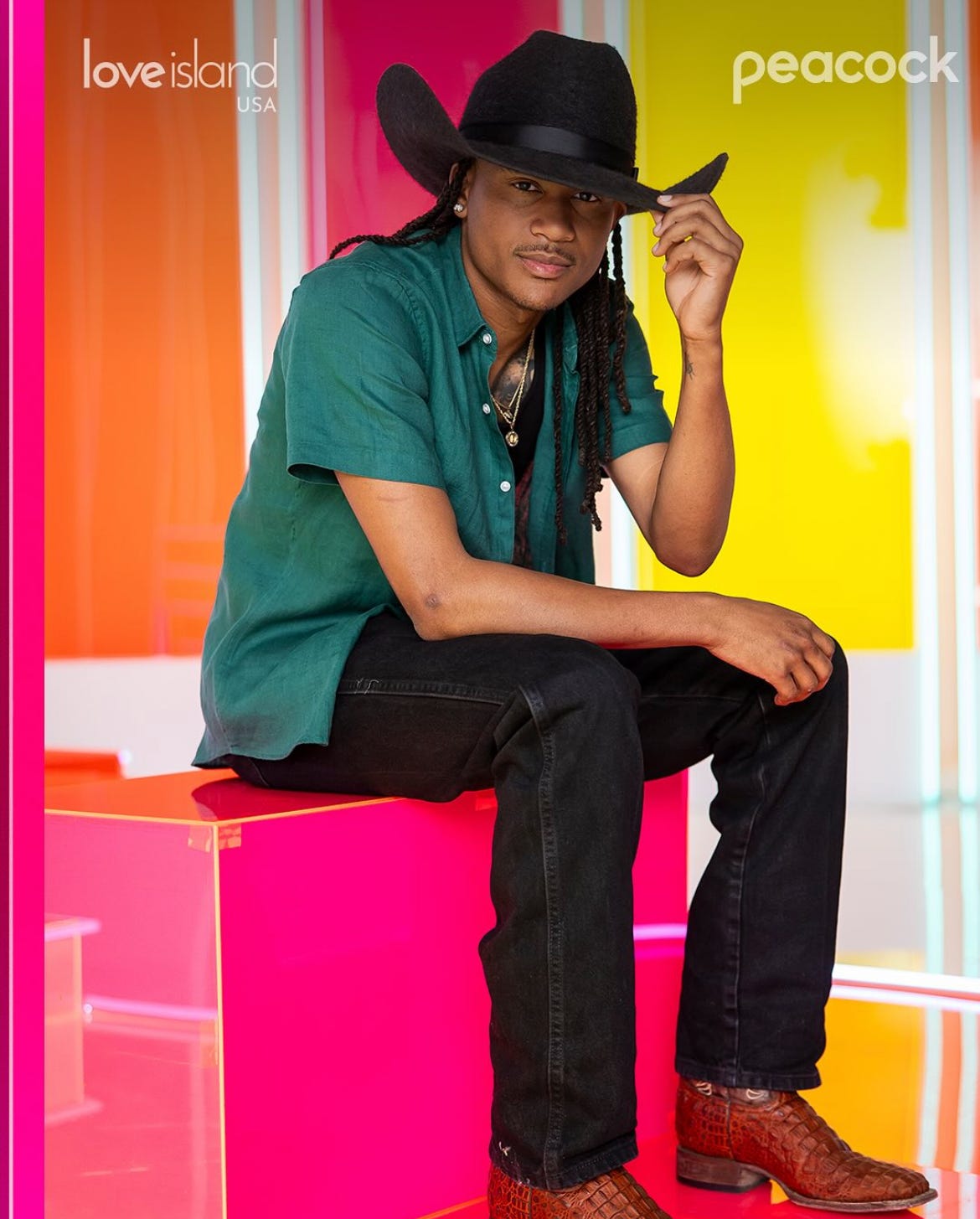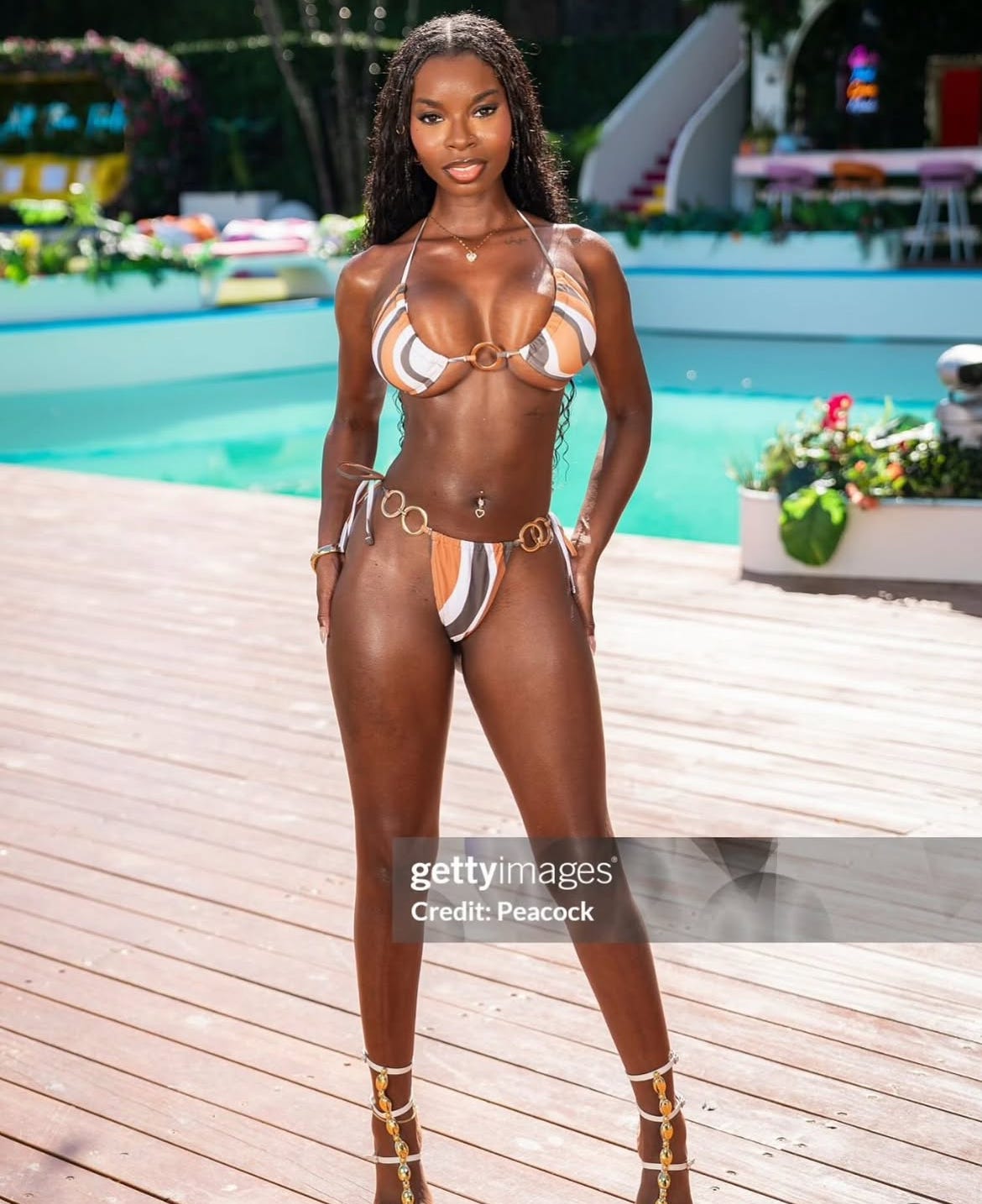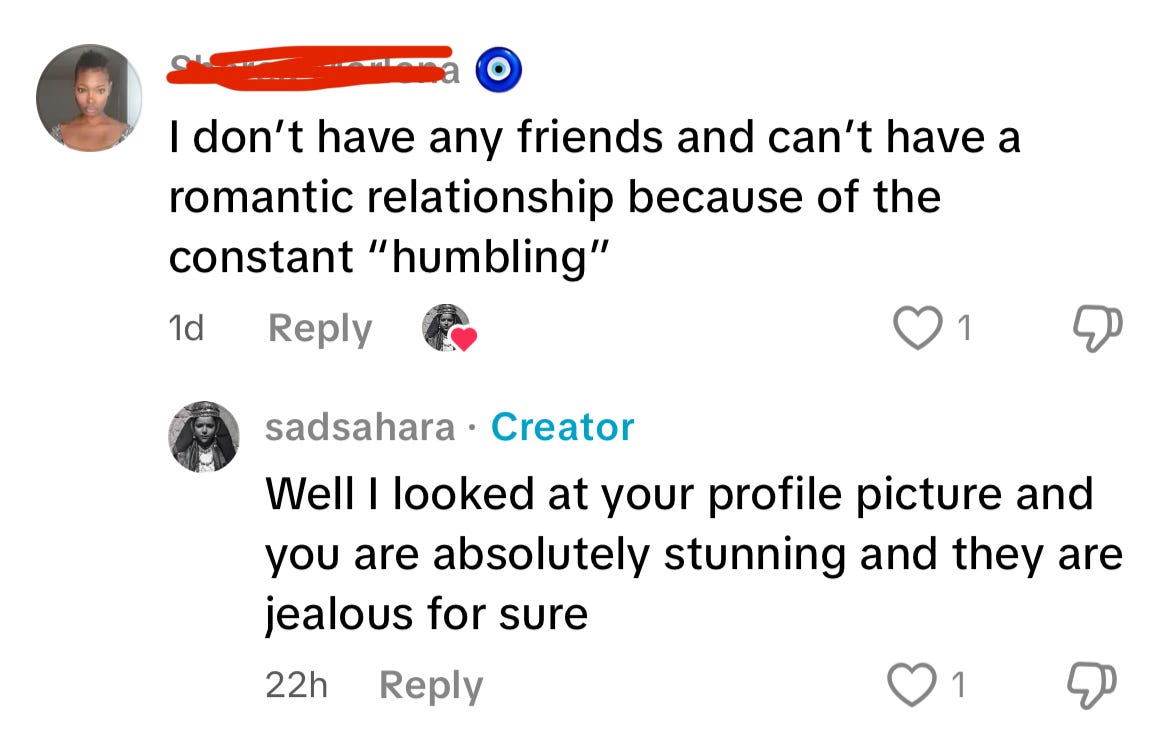in case you haven’t been informed, we’re nearing the end of love island USA season seven and everyone has been watching. seriously, even my friends’ boyfriends stopped pretending they’re above it. but if you have more honorable ways to pass time than watching hot people swap saliva and verbally abuse each other five nights per week, allow me to womansplain the drama that inspired my reflections on desirability, delusion, and the flattering lies women tell each other.
on day one of their six-week quest for love, sexy elevator saleswoman, olandria, and self-proclaimed cowboy, taylor, chose to couple up. the pair was invested primarily in each other for a solid three and a half weeks (roughly the equivalent of a common law marriage in love island time), so naturally it made for reality TV gold when he dumped her for another girl out of the blue.
this act of betrayal sent women from all corners of the world into an uproar — not because the masses believed their fling would stand the test of time, but because olandria is, like, really fucking attractive. taylor on the other hand… well, he’s definitely there. beauty is in the eye of the beholder, i know, but to me and millions of other beholders, olandria is undeniably hotter than the man who did her dirty.
you tell me if you disagree.
love island fans were stunned that this boyish-looking cornball could A) pull such a baddie and B) forsake such a baddie — all before we knew what hit us. even after taylor told his castmates point-blank that he never felt any chemistry with olandria, many women rejected his explanation, flooding social media with their own theories instead.
“he was just intimidated by her beauty.”
“he knew she was too good for him.”
“he’s definitely gay.”
“you can’t look like THAT and not want HER.”
frustrated commenters churned through all the familiar excuses, none quite willing to confront the less palatable reality, which is that olandria is exceptionally beautiful and she still got rejected.
the way women scrambled to rationalize olandria’s rejection revealed just how much it struck a collective nerve. i don’t think the breakup itself left viewers feeling particularly heartbroken, but i do think it challenged an illusion that many women quietly cling to: that if a woman is beautiful enough, that sort of thing shouldn’t happen to her.
when a smokeshow like olandria is rejected, criticized, or abandoned, it momentarily shatters this illusion, and other women will scramble to piece it back together for her. this is rarely done by prompting genuine reflection or accountability, but instead with quick-hit affirmations like, “you’re just too hot babe!” and “they couldn’t handle you!” it’s easier to soothe the sting with flattery than to face the unsettling truth that implicates us all — that nothing can protect a woman from getting hurt, not even a perfect face.
in constantly pointing to a woman’s beauty as the scapegoat in her interpersonal conflicts, we seem to have formed a gender-wide circle jerk of delusion — one that reinforces the same beliefs about women’s worth that keep us anxious and vulnerable. every time we tell a friend, no matter how pure our intentions, that she was overlooked, passed up, or left out because someone else was intimidated, insecure, or jealous, we add fuel to the narrative that her desirability is the only trait driving her life forward, whether it’s the reason things come together or fall apart.
with enough social conditioning, the psyches and group chats of hot women start to run on this logic:
“that boss who always suggests edits on your canva presentations isn’t high strung; she’s jealous of you.”
“that guy who love bombed and ghosted you wasn’t emotionally immature; he was scared of how badly he wanted you.”
“that one friendship didn’t implode because you two were toxic for each other; she just got tired of living in your shadow.”
“olandria wasn’t rejected by taylor because he didn’t like her; he just couldn’t handle such a bad b*tch.”
of course, beautiful delusional women and their beautiful delusional friends do not spawn out of thin air. they are the inevitable result of a world that shows a little girl, practically fresh out of the womb, that her beauty is the most valuable asset she will ever possess.
the messaging starts early and harmless enough, perhaps with some old church ladies pinching her cheeks and gushing, “this one’s gonna break hearts!” or later on, hearing her mom reminisce about scoring every job and boyfriend she ever wanted because she once had perky boobs and weighed a hundred pounds soaking wet. by the time this little girl is a fully baked woman, it’s been reinforced in a thousand other subtle ways that beauty is her golden ticket to always feeling powerful, safe, and in control.
and to be fair, the world does tend to deliver on this promise — at least on the surface. beautiful women do, in fact, exist in an entirely different reality than most people. (read inside the hot girl economy for more on this). dinners and vacations are complimentary, validation comes on demand, and random acts of kindness wait at every corner. not to mention, fitting neatly into the prevailing beauty standard of her time remains one of a woman’s most reliable routes to upward social mobility.
so, i get it. when your looks have usually been the reason new doors open, it’s not surprising you’d assume your looks are also to blame when doors shut. desirability becomes the primary filter through which you experience the world, and through which you assume the world experiences you.
you don’t need to watch love island or get inducted into a girls’ group chat to see this same logic at work. just google “the dark side of pretty privilege.” you’ll stumble down a rabbit hole of tiktoks, articles, and reddit threads, all from conventionally attractive women insisting that being hot makes their lives incredibly difficult.
they say other women are too jealous to befriend them. co-workers plot their downfall behind closed doors. men are too obsessed, too intimidated, too lustful, or too insecure to treat them right. some of these creators have even gone as far as to argue that conventionally attractive women are at higher risk for sexual assault. they fail to clock these experiences for what they more often are: misogyny, run-of-the-mill human messiness, or (brace yourself) their own behavior… no, the explanation is always the same, plastered across every platform: they’re just too darn pretty.
this brand of pretty woman victimhood, while, yes, deeply annoying, is mostly just sad. because when a woman decides that being too sexy is the root of all her worldly problems, she skips the part where she might reflect and learn something new about herself, her relationships, or the flawed systems she’s operating within. she misses every opportunity to develop the kind of awareness and emotional intelligence that would actually bring her closer to the connection and peace we can assume she’s after.
and this “dark side of pretty privilege” propaganda doesn’t just flatten the women pushing it — it erases the experiences of women who don’t fit conventional beauty standards, who still face all of these issues and worse. these women are rarely offered the same sympathy or viral attention, because when an average-looking woman is excluded, overlooked, or mistreated, no one gasps. no one rushes to shower her with affirmations about how she’s too physically perfect for her own good. we’re only baffled when it happens to someone like olandria from love island, because deep down, we assume a woman that gorgeous will receive exactly what we were all promised: power, safety, and control.
the sooner we can decenter beauty as the root of attractive women’s inevitable pain, though, the sooner women as a collective can start untangling the messy illusion we’ve been sold. because if jaw-droppingly hot women get screwed over just like everyone else, it’s probably not proof that beauty is a curse, but that it was never the security blanket we imagined.
rewriting this narrative might inch us closer to accepting that fitting neatly into the beauty ideal, while absolutely a form of privilege, won’t shield women from the things we fear most: being used, abandoned, betrayed. and in that case, it’s probably not the cornerstone our identities should be built on. maybe then we’d waste less of our time anxiously striving to stay sexy and skinny and ageless into eternity, and spend a bit more of it building a sense of worth that sticks when no one’s looking.








Yeah I'm not going to lie, watching Olandria, Andreina, and other beautiful women on LI experiencing rejection changed by brain chemistry in an oddly refreshing way.
When I've been friendzoned, I've often internalized the experience as proof that I'm not attractive enough. Like I just got denied entry to the pretty girl club. But Love Island has so many clear examples of this just not being the case all the time.
I've often read that even the most beautiful women on Earth will not be every person's cup of tea but always took it as major cope. Seeing it play out on screen is something else.
Also, I laughed out loud at the Taylor / Olandria comparison. A moment of silence for Olandria's beauty!
Wrote about this recently--for whatever reason, women have a very hard time taking responsibility for the condition of their relationships. I was mostly making this point about romantic relationships, but maybe it's true of others as well?
Like, men are WORSE at relationships in general, but guys who don't have friends, or who suck with women, or whatever, typically acknowledge that it's their fault. https://getbettersoon.substack.com/p/women-should-be-held-accountable